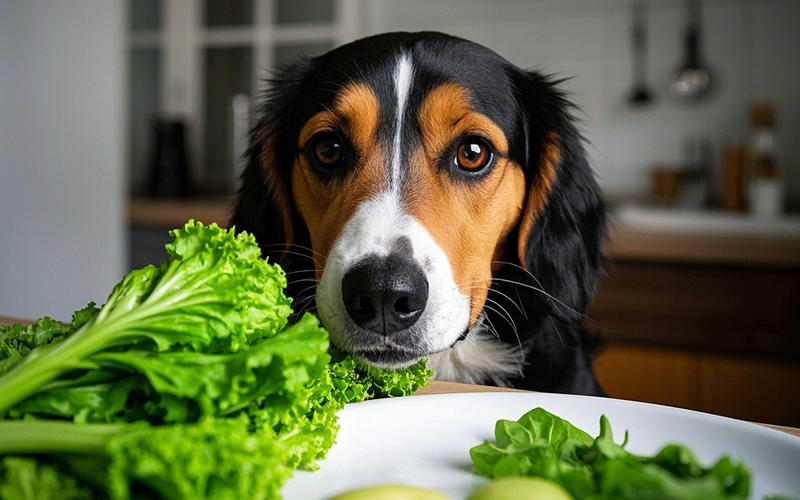Can Dogs Eat Greens? Here's What You Need to Know
- 28 Mar 2025 15:04
Greens, like leafy vegetables, can be a healthy and nutritious addition to your dog’s diet. However, not all greens are created equal, and some are better for dogs than others. Let's dive into the benefits, risks, and guidelines for feeding your dog greens.

The Benefits of Greens for Dogs
Rich in Nutrients
Greens like spinach, kale, and collard greens are packed with essential nutrients such as vitamins A, C, and K, fiber, and minerals like calcium and iron. These nutrients help support your dog's immune system, digestive health, and skin health. 🌱🍃Low in Calories
Greens are low in calories, making them a great choice for dogs that need to maintain a healthy weight. They can be a filling, low-calorie snack or supplement to your dog’s regular food without adding extra pounds. 🐾Rich in Fiber
The fiber content in greens helps with digestion, promoting regular bowel movements and preventing constipation. This can be especially helpful for dogs with sensitive stomachs or digestive issues. 🐕🦺
The Risks of Feeding Greens to Dogs
Oxalates
Certain greens, such as spinach and kale, contain oxalates, which can interfere with calcium absorption and may contribute to kidney stones or bladder stones when consumed in large amounts. If your dog has a history of kidney or bladder issues, it's best to limit their intake of these greens. ⚠️Gas and Bloating
Some dogs may have trouble digesting certain greens, leading to gas and bloating. This is particularly common with cruciferous vegetables like broccoli or cabbage. Introducing greens slowly into your dog’s diet can help reduce the risk of digestive upset. 💨Toxic Greens
Not all greens are safe for dogs. For example, wild greens or toxic plants like rhubarb leaves and certain types of mushrooms can be extremely harmful. Always make sure that the greens you feed your dog are safe and properly identified. 🚫
Safe Greens for Dogs
Here are some of the safest and most nutritious greens you can offer your dog:
Spinach: Packed with iron and vitamins, but should be served in moderation due to oxalates.
Kale: High in fiber and antioxidants, but again, it contains oxalates, so serve in moderation.
Collard Greens: Rich in vitamins and calcium; best cooked to reduce oxalates.
Lettuce: A low-calorie, hydrating snack that’s generally safe for dogs.
Parsley: A great source of vitamin C and antioxidants, it can also freshen your dog’s breath.
How to Safely Serve Greens to Your Dog
Cook Them
Cooking greens can make them easier to digest and help reduce the content of oxalates, making them safer for your dog to consume. You can steam or boil greens without adding any seasoning or oil. 🥘Introduce Slowly
When adding greens to your dog’s diet, start with small amounts to see how they respond. If your dog experiences any signs of digestive upset like vomiting or diarrhea, stop giving them greens and consult a pet health professional. 🌿Avoid Seasonings
Never add salt, butter, or any other seasonings to the greens. Some seasonings, like garlic or onion, are toxic to dogs and can cause serious health problems. Keep it simple and natural. 🍽️
What to Do if Your Dog Eats Too Many Greens
If your dog eats too many greens or a type of green that’s not safe, monitor for any signs of digestive distress such as vomiting, diarrhea, or bloating. If you notice any of these symptoms, or if you’re unsure whether a specific green is safe, contact a pet health professional right away. You can also reach out to PettureX for a 24-hour online consultation for expert advice. 📱
The Bottom Line: Can Dogs Eat Greens?
Yes, dogs can eat greens, but you need to be mindful of the type and quantity. Spinach, kale, lettuce, and collard greens are great options when prepared and served properly. Always serve greens in moderation, cook them when necessary, and avoid adding harmful seasonings. If you’re ever in doubt, PettureX offers 24-hour online consultations to ensure your dog’s health and safety. 🌿🐶
Related

Crunchy Curiosity: Can Dogs Safely Snack on Pork Rinds? A Deep Dive
- 21 Apr 2025
Pomegranate Seeds and Pooches: A Deep Dive into Whether Dogs Can Safely Indulge
- 21 Apr 2025
Can Dogs Eat Peaches? Vet Explains Benefits, Cyanide Risks & Safe Serving
- 16 Apr 2025
Can Dogs Eat Mulberries? Vet Explains Safety, Benefits & Potential Risks
- 16 Apr 2025
Can Dogs Eat Mozzarella? Vet Explains the Cheesy Truth (Risks & Benefits)
- 16 Apr 2025
Can Dogs Eat Mango Skin? Vet Explains Why It's a Risky Chew!
- 16 Apr 2025
Can Dogs Eat Maple Syrup? The Sugary Truth & Why Vets Advise Against It
- 16 Apr 2025
Can Dogs Eat Mac n Cheese? Vet Explains Why This Comfort Food Is Unsafe!
- 16 Apr 2025
Can Dogs Eat Liver? Vet Guide to This Nutrient-Dense Organ Meat (Benefits & Risks!)
- 16 Apr 2025
Can Dogs Eat Lamb? Vet Insights on This Nutritious Meat Option
- 16 Apr 2025
